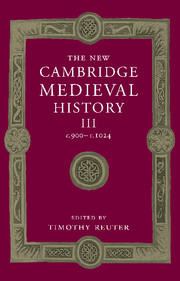
- Cited by 5
-
Cited byCrossref Citations
This Book has been cited by the following publications. This list is generated based on data provided by Crossref.
Melve, Leidulf 2003. Literacy --Aurality --Orality A Survey of Recent Research into the Orality/Literacy Complex of the Latin Middle Ages (600-1500). Symbolae Osloenses, Vol. 78, Issue. 1, p. 143.
2014. The Apocalypse in the Early Middle Ages. p. 189.
Sutt, Cameron 2014. The Early Árpáds (895–1095): Consolidation, Christianization, Monarchy. History Compass, Vol. 12, Issue. 2, p. 150.
Roberts, Edward 2019. Flodoard of Rheims and the Writing of History in the Tenth Century.
Herrick, Samantha Kahn 2024. Medieval Arles through the Lives of Its Founding Bishop. Religions, Vol. 15, Issue. 7, p. 877.
- Publisher:
- Cambridge University Press
- Online publication date:
- March 2008
- Print publication year:
- 2000
- Online ISBN:
- 9781139055727




